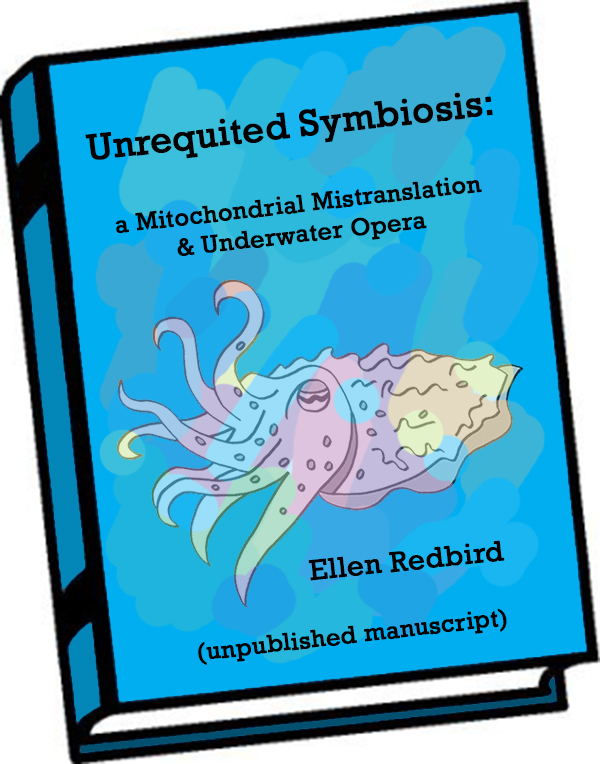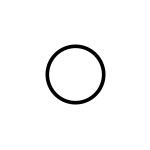 Unrequited Symbiosis: a Mitochondrial Mistranslation & Underwater Opera,
Unrequited Symbiosis: a Mitochondrial Mistranslation & Underwater Opera,
unpublished hybrid poetry manuscript
by Ellen Redbird
“Long had we wandered against a blade of cornbloom, least of cold art. Some rend glass, mend it, or make of it doubt. What unanchored our minds to outmode mountain lake beds, still, over all hindrance, rakes us from the burden of roads. But it was different when only half ourselves.”
You can read another excerpt in Tarpaulin Sky.
Watch video of a performance of “Seventh Half,” an excerpt from Unrequited Symbiosis.
______________________________________________________________________________________________________________________________
Read what these forms have to say about Unrequited Symbiosis:
______________________________________________________________________________________________________________________________

Dot:
I laughed. I cried. And then I read Unrequited Symbiosis.
______________________________________________________________________________________________________________________________

Triangle:
To rediscover the parent, the child, and the holy/hungry ghost, look no further than Unrequited Symbiosis. Want to trip the alarm fantastic about devastation to the marine ecosystem? How we reject ourselves when we reject others? How we long for what we can’t have at the expense of that to which we are already connected? Do it with poetry. Read, chant, and collaborate with Redbird’s Unrequited Symbiosis. Who is it about?
______________________________________________________________________________________________________________________________
 Square:
Square:
So I look for a story somewhere in Unrequited Symbiosis, and I think I grasp the setup. Here are mitochondria, personified as tour guides with a penchant for the technical, speaking to someone named Six who is always referring to themselves in the first person plural as if they were conjoined sextuplets who can speak in unison. I’ve never met anyone like that, but I’m willing to make an exception. Also, this protagonist has no specified gender, so I guess referring to Six as “them” is convenient.
Six seems to be inside a cell or inside a mitochondrion. But not just any mitochondrion, Six’s own mitochondrion. How you can be inside your own mitochondrion is beyond me, literally. But then it seems like this is all happening in a dream, so I can excuse the paradox.
I’m all set to take a tour of a cellular reality when, bam, suddenly the protagonist and I are underwater. We’re singing recitative to sea creatures, and they’re responding in kind. So it’s an underwater journey, but it also seems like a dream. The return to conversing with the mitochondria mid-poem, telling it a bunch of acrostic mini-dreams, is like floating in a lighter reverie, one dream layer closer to resurfacing to awake-land, but then we fall back down into the fathoms.
Why are these sea creatures taking Six deeper and deeper? How come they keep asking Six to remember things? It’s like some ultra-cryptic psychoanalysis session in a mysterious underworld saga without any clear monsters to battle. But Six does struggle. With language. With having to open up to this incorrigible pageant of porpoises and sea slugs. Six internally/eternally struggles with a pitiably futile search for the ideal but math-defying “seventh half,” the missing romantic piece to Six’s nonsensically seven-piece puzzle of selfhood. Six wants the character Seven so bad, it’s obsessive. Six recounts childhood baggage in a dizzying syntax I can barely follow. Apparently, this homophonically mistranslated prose-poetry is considered a “memory aria” by the poet. Later, Six goes on and on about longing and rejection—about storms and oil spills and the inability to rescue baby seals and such. And things get crazier and crazier until I want to shout, “I get it! You’re trying to drown me in anagrams!” And then…well, I won’t spoil the ending. Though, frankly, I found it anticlimactic, even inevitable.
I know my tone is a bit dismissive, and I’m sure I’m oversimplifying some things. But it’s not easy to hold the copious complexity of this piece. The poet seems to want to conceptually and musically cram everything in and roil it up into a mess of ordeal. And yet, I don’t want to completely discount this book. I keep returning to it, though first it doesn’t quite fit in the neat quadrangle of my mind, then it fits too snuggly, and then it slips out a crack in the door. However lyrical and crafted, this is an exhausting read. For one thing, I had to continually look up zoological terminology, for which Redbird seems to have an unnatural zeal. And though the poem weaves together a few twisted, nongendered, and sometimes highly conceptual retellings of The Little Mermaid by H. C. Andersen, I have a sneaking suspicion the story is really about the poet. I hear they are a fragmented, tempestuous lot.
______________________________________________________________________________________________________________________________
 Circle:
Circle:
The author is half Danish. The protagonist Six is only “halfself.” Unrequited Symbiosis is a mistranslation of Andersen’s The Little Mermaid from the original Danish into a strange English poetry. The mermaid is half fish, half human. The world is divided into ocean and land. Translation is like transformation. Anderson’s little mermaid transforms when she wants to go on land, stepping as if on knives, to live with the prince she anonymously rescued. Redbird’s hero wants union with another, too, but feels the sting of crossing the border. Sacrifice is painful. The new question: Is it noble? And: Who is actually sacrificed? Six might not be a maid and might not have a tail, but this is a tale made to be read—if you can wade through the foaming breakers of conceptual poetry to a nice bit of fishy narrative.
______________________________________________________________________________________________________________________________
 Spiral:
Spiral:
There I was, suffering from loss: bemoaning unrequited love, unanchored within the abyss of my own psyche, and losing touch with both the solidity and flexibility of organic form—blade of algae, eye stock, calcium carbonate coil, protective scale, each cell in my own body, each energy-producing mitochondrion. I was lost in longing for the painful and seemingly impossible transformation from old self to new. I wanted to be worthy, to be the beloved hero. Trying to rescue my ancient parents, every distant lover, the whole broken world…and learning rescue can damage—who escapes the expense? There I was, wondering where communion and ecology are when people scramble to tear apart their own home, and all the life that supports it, to make some kind of “living.” I didn’t want to see my own reflection and yet projected it darkly everywhere. I floated in isolation at hurricane’s center, excited to act though anxiety stricken. I was hungry, confused, feeling incomplete, needing to fall apart but fearing it, in a dream, seeking a totem, swept away by the pathos of some absurd opera tragedy, self-critical to the point of crumbling, and denying to the point of having no choice but to remember. Trading my voice for silence, my comfort for foreign mobility, I was like the mer-person in that Danish story, ready to sacrifice everything for what I thought I was missing: the eyeless Someone Else who blazes like an empty sky.
There I was, and then there it was: Unrequited Symbiosis. I caught the connection. Not immediately. Not in a way I expected. But through trial-by-lingual-fire—the poetry of dream and unconscious oceanic translation of the barely translatable. The poetry of the ridiculous and bewildering meets desire meets despair meets musical decodings of unbounded color. The poetry of creatures, endlessly intricate and inscrutable. Something felt possible. This was my catalyst hybrid. My catharsis. My chance to change form. A way to let go of over-navigating the descent that drowns and disintegrates my selves only to then revive them, all and one.
______________________________________________________________________________________________________________________________
 Pentagon:
Pentagon:
There’s a reason twenty small literary presses rejected the manuscript Unrequited Symbiosis: It’s anti-oil and therefore anti-American! Ban it from the schools! Burn it now!
______________________________________________________________________________________________________________________________
 Squiggle:
Squiggle:
This is a dynamic read! Precision meets splattered paint. Don’t get too attached to making linear sense, though lines of thought and narrative can be followed. I say “don’t get attached” because this story is about abandon. Abandon yourself to the vast sea. Unmoor from what you are supposed to know to what can be learned. Focus on animal detail while letting the energy of hyper-aware yet deeply figurative language currents pull you out and suck you down. Unrequited Symbiosis is full of play even as it is dead serious and darkly urgent. Don’t let people explain it to you before you experience it yourself. There is more going on in those lines than a tidy message. The poetry is alive. Let it curl and uncurl inside you like a spirited seahorse. Let it take the many surprising shapes of a cuttlefish.
______________________________________________________________________________________________________________________________
 Bottom Line:
Bottom Line:
These reviews are all hype. The manuscript is what it is and, if you read it, will be what it becomes. No need to expect wonders. Just something to try out. It has a beginning, middle, and end. If you start reading, it is possible to exit out the other side fairly unscathed. Sure, it took Ellen Redbird eight years to complete. Sure, she would love it to be published in full. Read by more than five people. Interpreted variously. Even enjoyed. So if you’re curious, ask her about it.